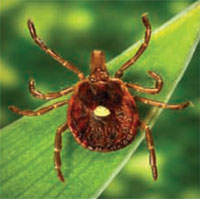This news item expired on Wednesday, August 30, 2017 so the information below could be outdated or incorrect.
As weather gets warmer, many people take their activities outdoors to enjoy the beauty of Western North Carolina. Health risks from biting bugs make that harder to enjoy. A few easy steps can protect us from disease-carrying mosquitoes and ticks:
Guarding against Mosquito Bites
The best thing to do is stop the mosquito cycle before they can lay eggs. Eliminate any standing water around your home. Even very small amounts of standing water can be a breeding ground. If you have tires, flowerpots, pet bowls, toys, bird baths, tarps, containers, etc., make sure water doesn't sit in them longer than three days.
Once mosquitoes are already buzzing around, avoid bites to reduce your risk. Install or repair window and door screens to keep them from coming into your home. Mosquitoes are most active during the early morning or evening hours. If you plan to be outdoors, wear long-sleeved shirts and long pants. And don’t forget the mosquito repellent. Those that contain DEET, Picaridin, or Oil of Lemon Eucalyptus are effective in fighting off bites.
Mosquito Diseases:
La Cross Encephalitis is the most commonly diagnosed mosquito disease in North Carolina. In fact, 75% of cases reported in North Carolina during the past decade were from people living right here in Western North Carolina! They also carry West Nile virus. Symptoms include fever, headache, tiredness, body aches; skin rash and swollen lymph glands – although many people infected have no symptoms at all.
 Protection from Tick Bites
Protection from Tick Bites
Ticks are around all year long, but are more active in warm, summer months. Avoiding ticks can be tricky since they are very small and often hard to spot in wooded areas and fields, which are places they are typically found. Follow some easy guidelines to prevent bites:
- When possible, avoid wooded and bushy areas with high grass and leaf litter.
- If those areas cannot be avoided, wear a long-sleeved shirt, long pants and socks. Tuck your shirt in, pull your socks over your pants, and walk in open areas, away from brush.
- Use an insect repellent that contains DEET.
Finally, check yourself and children at least twice a day. The sooner you find a tick on you, the less chance it will have to bite. Check for ticks under the arms, in and around the ears, inside the belly button, behind the knees, between the legs, around the waist, and especially in their hair.
When you find a tick, remove it as soon as possible. Use fine-tipped tweezers to grasp the tick as close to the skin's surface as possible. Pull slowly and steadily until the tick releases. Do not twist or jerk the tick. Wash the bite and your hands with rubbing alcohol, or soap and water once the tick has been disposed of.
Tick Diseases:
Ticks carry many different diseases including Rocky Mountain Spotted Fever and Lyme Disease. Rocky Mountain Spotted Fever is the most common tick borne disease reported in North Carolina. It can be a severe or even life threatening illness if not treated in the first few days of symptoms. Common symptoms from a tick bite include fever, chills, headache, body aches, pains in the joints or muscles, and a red rash.
If you have questions or concerns about mosquitoes or ticks, contact the Environmental Health Division at Buncombe County Department of Health at 250-5016.